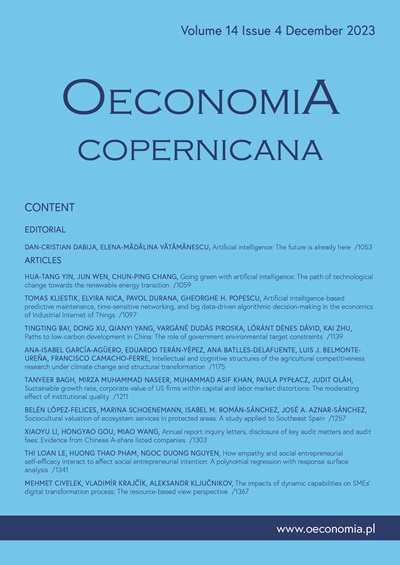Digital twin simulation modeling, artificial intelligence-based Internet of Manufacturing Things systems, and virtual machine and cognitive computing algorithms in the Industry 4.0-based Slovak labor market
IF 7.6
1区 经济学
Q1 ECONOMICS
引用次数: 0
Abstract
Research background: On the basis of an analysis of the current situation and expectations in the field of implementation of the elements of the Industry 4.0 concept, the purpose of this paper is to identify the effects on the labor market in large manufacturing enterprises in the Slovak Republic. Purpose of the article: The presented work has a theoretical-empirical nature and consists of a theoretical section and a practical section, which includes statistical indicator analysis and quantitative research. In the theoretical section, the paper discusses the issue of Industry 4.0 in general, with a focus on its impact on the labor market, thus laying the groundwork for future research on the subject. Methods: The output of this work is an analysis of selected indicators of the manufacturing industry sector in the Slovak Republic, based on the most recent employment data analysis in the first stage and quantitative research survey in the second stage, with the respondents being manufacturing industry companies operating in the Slovak Republic, and whose primary objective is to determine the current status of the implementation of the elements and technologies of Industry 4.0 in production companies in the Slovak Republic, as well as the factors influencing this situation, such as digital twin simulation modeling, artificial intelligence-based Internet of Manufacturing Things systems, and virtual machine and cognitive computing algorithms. Findings & value added: The research findings indicate that the degree of digitization adopted by businesses in the Slovak Republic is comparatively less robust and more sluggish to adapt. This is primarily attributable to the underdeveloped educational system, population reluctance, self-actualization, and inadequate state support. Recommendations for the Slovak market aim to increase the digital proficiency of businesses and of the general populace through various means, such as reforming legislation, enhancing state support for entrepreneurs, and modifying the education system, constituting the added value of the work.基于工业 4.0 的斯洛伐克劳动力市场中的数字孪生模拟建模、基于人工智能的制造物联网系统以及虚拟机和认知计算算法
研究背景:在分析工业 4.0 概念要素实施领域的现状和预期的基础上,本文旨在确定对斯洛伐克共和国大型制造企业劳动力市场的影响:本文具有理论-实证性质,由理论部分和实践部分组成,其中包括统计指标分析和定量研究。在理论部分,本文从总体上讨论了工业 4.0 的问题,重点关注其对劳动力市场的影响,从而为今后的相关研究奠定基础:这项工作的成果是对斯洛伐克共和国制造业部分指标的分析,第一阶段基于最新的就业数据分析,第二阶段基于定量研究调查,调查对象是在斯洛伐克共和国运营的制造业公司,主要目的是确定工业 4.0 要素和技术在斯洛伐克共和国生产公司的实施现状。研究结果与附加值:研究结果表明,斯洛伐克共和国企业采用的数字化程度相对较低,适应能力较弱。这主要归因于教育系统不发达、民众不情愿、自我实现以及国家支持不足。针对斯洛伐克市场提出的建议旨在通过各种手段,如改革立法、加强国家对企业家的支持、修改教育系统等,提高企业和普通民众的数字化能力,从而实现工作的附加值。
本文章由计算机程序翻译,如有差异,请以英文原文为准。
求助全文
约1分钟内获得全文
求助全文
来源期刊

Oeconomia Copernicana
ECONOMICS-
CiteScore
13.70
自引率
5.90%
发文量
26
审稿时长
24 weeks
期刊介绍:
The Oeconomia Copernicana is an academic quarterly journal aimed at academicians, economic policymakers, and students studying finance, accounting, management, and economics. It publishes academic articles on contemporary issues in economics, finance, banking, accounting, and management from various research perspectives. The journal's mission is to publish advanced theoretical and empirical research that contributes to the development of these disciplines and has practical relevance. The journal encourages the use of various research methods, including falsification of conventional understanding, theory building through inductive or qualitative research, first empirical testing of theories, meta-analysis with theoretical implications, constructive replication, and a combination of qualitative, quantitative, field, laboratory, and meta-analytic approaches. While the journal prioritizes comprehensive manuscripts that include methodological-based theoretical and empirical research with implications for policymaking, it also welcomes submissions focused solely on theory or methodology.
 求助内容:
求助内容: 应助结果提醒方式:
应助结果提醒方式:


